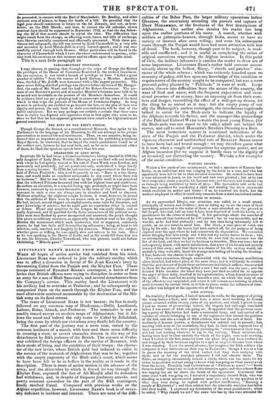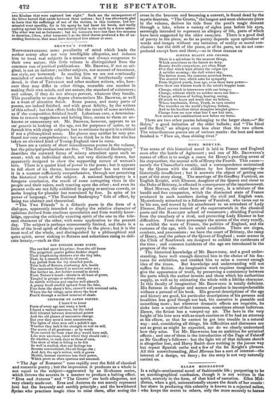LIEUTENANT BARR'S MARCH FROM DELHI TO CABUL. WHEN all hopes
of active service had vanished from his mind, Lieutenant BAER was ordered to join the military medley which was to affect a diversion in favour of Sir Jonas KEANE'S army by threatening Cabul from the Punjab and the Khyber Pass. These troops consisted of RUNJEET SINGH'S contingent, a batch of new levies that British officers were trying to discipline in order to form an army for a son of Shah SHOOJAH'S, and several detachments front the Company's service. This motley band the Lieutenant with his artillery had to overtake at Peshawur ; and he subsequently ac- companied them on the march through the Khyber Pass, and the road afterwards rendered memorable by the destruction of the Bri- tish army on its fatal retreat.
The route of Lieutenant BARR is not beaten : its line is easily followed on any common map of Hindostan,—Delhi, Loodianah, Lahore, Rotas, Attoek, and Peshawur. The remainder is not so readily traced except on modern maps of Afghanistan ; but it fol- lows the usual and indeed the only route to Cabul by Jellalabad, being the same by which our victorious army finally left the country.
The first part of the journey was a mere tour, varied by the common incidents of a march, with here and there some difficulty in crossing a river, or covert obstacles thrown in the way of the detachment by Sikh jealousy of the British. The sojourn at Pesha- war exhibited the foreign officers in the service of RUNJEET, with their mode of living, and the condition of their troops ; the charac- ter of the new levies, whom British gold had induced to enlist in the service of the monarch of Afghanistan that was to be ; together with the empty pageantry of the Shah-zada's court, which seems to have been felt to be as hollow in the reality as it reads in the description. There is more of active motion in the advance of the army, and the skirmishes by which it forced its way through the Khyber Pass, captured the fort of Ali Musjid after its defenders had withdrawn, and, in despite of frequent predatory attacks, and pretty constant cowardice on the part of the Sikh contingent, -finally reached Cabul. Compared with previous works on the Afghan expedition, however, Lieutenant Bean's book is of neces- wity deficient in incident and interest. There are none of the diffi-
culties of the Bolan Pass, the larger military operations before Ghuznee, the uncertainty attending the pursuit and capture of DOST MOHAMMED, or the freshness of the first descriptions of Afghanistan. Our author also detains his reader too long upon the earlier portions of his route. A march, whether with soldiers or palanquin-bearers, through India, seems to have no variety or interest after once telling ; and even his subsequent route through the Punjab would have had more attraction with less of detail. The book, however, though past in its subject, is read- able and unaffected ; and it is useful as completing the series of original narratives respecting the Afghan invasion. In this point of view, the indirect inferences it enables the reader to draw are of some importance. Lieutenant BARR'S rather bald account uncon- sciously shows up the hollow, flimsy, " shreds and patches" cha- racter of the whole scheme ; which was evidently founded upon no necessity of policy, still less upon any knowledge of the condition or requirements of the country sought to be conquered, but was a mere protocol policy planned by " Politicals " in want of work. Large armies, thrown into difficulties from the nature of the country, the want of food and water, with the frequent expectation and occa- sional presence of an enemy, have an imposing air from their num- bers and danger, resembling the effect of a well-got-up drama, let the thing be as unreal as it may : but the empty pomp of our ally the Maharajah's useless contingent, the treacherous vagabonds bribed to enlist for the Shah-zada to indicate the loyalty of the Afghans towards his father, and the manager-like proceedings of the Political Colonel WADE towards the poor young Prince, (for the Shah-zada was not equal to his role,) admit one behind the scenes, and call to mind HOGARTH'S Strollers Dressing in a Barn.
The most immediate matter is occasional indications of the state of the Punjab and the Peshawur district, which under the vigorous character and undisturbed rule of RGNJEET SINGH seems to have been bad and brutal enough : we may therefore guess what it is now, when a couple of competitors for supreme power, and an Afghan incursion (for we suppose it hardly rises to the dignity of an invasion) are distracting the country. We take a few examples of the social condition.
WAYSIDE SIGHTS.
Within a few yards or our encampment, we had a specimen of Eastern bar- barity, in an individual who was banging by the heels to a tree, and who had apparently been left to die in that dreadtul situation. He seemed to have been a man advanced in years, as his beard and hair were grizzled ; but as lie had been suspended about a month, his features were not distinct, and rendered less 80 through being mutilated by birds of prey. The bystanders told us he had been thus punished for murdering a child and stealing the silver ornaments which encircled its ankles and wrists : if so, he deserved his death, but the method employed to effect it could only emanate from a most uncivilised nation.
EXECUTIONS IN SCINDE.
As we approached Dingie, our attention was called to a small crowd, principally of women and children ; and on riding up to see the cause of their assembling, perceived in the midst of them a man stretched on tbe ground at full length, who had, half an hour before, been deprived of both his bands, as a punishment for the crime of stealing. A few quiverings about the muscles Of his legs were all that betokened he still existed : but he was insensible, and DO wonder, as he had bled profusely ; and he was thus being inhumanly left to perish, as no one dared to assist him. The block, a rude piece of wood, was lying by his side ; but the hands had been carried off, for the purpose of being exposed near the spot where he had committed the depredation. We consulted about bringing him into camp, and I directed my native doctor to do so ; but, on attempting to remove the poor wretch, we were told the sentence was the law of the land, and that we had no business to interfere. This was true: hut we subsequently heard, %WI much satisfaction, that a few of his friends had secretly conveyed him away ; and that there is a chance of his life, as they would, im- mediately they were able, insert his stumps into boiling oil to allay the bleeding : I fear, however, the chance is but slight.
Two other executions, though unattended with the barbarous mutilations above detailed, had taken place at the same time; and it will hardly be credited that the punishment of death these unfortunate individuals suffered was awarded to them tor the crime of having killed a cow I but such was the case ; and the deluded Sikhs consider the blood they have just shed as called for to appease the anger of their deity, insulted in its representative, a four-footed creature of the earth ! The road led us nearly beneath a tree, on which the body of one of the offenders was suspended, and where it will remain ass warning to others, until devoured by carrion birds, or it falls to pieces under the influence of time : the other was hanged at the opposite side of the town.
SIKH JUSTICE.
On reaching Futtehgurh, I halted beneath its walls, for the purpose of giving the troop-horses a feed ; and whilst here, a scene most revolting to human nature occurred within twenty yards of my position, and which I grieve to say I had no means of preventing; indeed, the tragedy had well-nigh concluded before I was aware of what was going on. It appeared that the previous even- ing a party of Khyberries had made a successful foray, and had carried off a number of camels belonging to one of the regiments that formed the garrison of the fort, and also a couple of Sikh soldiers, who had the care of them. Im- mediately it became known, a detachment was ordered out in pursuit ; but, meeting with none of the marauders, they had, in their stead, captured two of their enemies' tribe, who were quietly pursuing the "even tenotur of their way," and had had nothing whatever to say to the robbery. These unfortunates, having been kept in close custody the whole of the night, were next morning, when I halted at the fort, removed from the place they had been confined in, and dragged by their ferocious captors to a spot at no great distance from where 1 was standing. I saw the crowd advance, but imagined the Sikh soldiers who composed it were mulineers on their way to Peshawur; though I was at a loss to guess the meaning of the dried bushes that they were carrying with them, and as for the wretched prisoners I did not observe them. The Sikhs, on stopping, immediately formed a circle, which was too dense for my vision to penetrate, and not caring to know what was going on Iliad turned away from the scene. Presently loud vociferation& of "Putthur se marol''—" Stone them to death I" caused me to look in this direction again ; and then a fierce flame was lapping the air far above the heads of the spectators. Convinced that some cruel work was going on, 1 accosted a respectably• dressed Sikh, who WU standing in a most unconcerned manner near me ; and to my question as to what they were doing, lie replied with perfect indifference, ••• Burning a couple of Khyberries"; and then related how the miserable wretches had fallen into their hands. I expressed my detestation of the cruel punishmeut ; when he added, "Why should we not ? the same fate has by this time attended the two Kb&lsas that were captured last night." Such are the consequences of the bitter hatred that exists between these nations: but I was afterwards glad to learn that the sufferings of one of the victims, in this instance, had ter- minated most speedily, for in his agony he had burst his bonds, and madly rushing against his enemies, was instantly felled to the earth by a dozen sabres. The other was not so fortunate ; but his torments were less than five minutes in duration, (then, what torments!) as the dried thorns produced a fire of ex- ceeding fierceness, that must have destroyed him almost at once.



























 Previous page
Previous page